Destruction of Food Security for the Palestinian People
One of the dire conditions that Palestinians endure due to the colonial actions of the Israeli regime is in the area of food supply. This regime has destroyed the food security of Palestinians through various policies. We will examine this issue below.
Israelis Eat More, Palestinians Go Hungrier!
The Israeli regime has undermined Palestinians’ food security by setting red lines on their access to proper nutrition. The Israeli government controls all food imports into the Gaza Strip and since 2007 has ordered that only the minimum amount of food should reach Gaza’s Palestinians. According to this order, for Palestinians in this area, 37 percent less than the average Israeli consumption of fruits and vegetables, 19 percent less than the average Zionist meat consumption, and 43 percent less than the average occupier dairy consumption is sufficient! Under this directive, Palestinians’ access to food in Gaza should be at a level that merely prevents malnutrition! Today, although Israel claims to have ended this policy, since 2017, 40 percent of Gaza households suffer from severe food insecurity, largely resulting from the blockade imposed by the Israeli regime.1



Famine in a Fertile Land!
The Israeli regime has colonized Palestinian agriculture through its apartheid policies. As a result of these policies, Palestinian food producers are trapped in the confiscation of lands, forced displacement, deprivation of water rights, restrictions on movement, limited market access, attacks by military forces and Israeli settlers. These obstructions have led to problems such as the destruction of agricultural heritage, food insecurity, hunger, poverty, and environmental damage in the fertile land of Palestine—problems whose solution lies in Palestinian food sovereignty, meaning the right of Palestinians to define their own healthy food and agricultural systems that align with their culture and environment. However, the Israeli regime has violated Palestinian food sovereignty over most items in this land through various restrictions. Water, black goats, milk, eggs, fish, medicinal plants, grapes, eggplants, tomatoes, onions, mushrooms, olives, strawberries, vegetables, barley, wheat, and millet are examples of restricted items in Palestine, each addressed below:
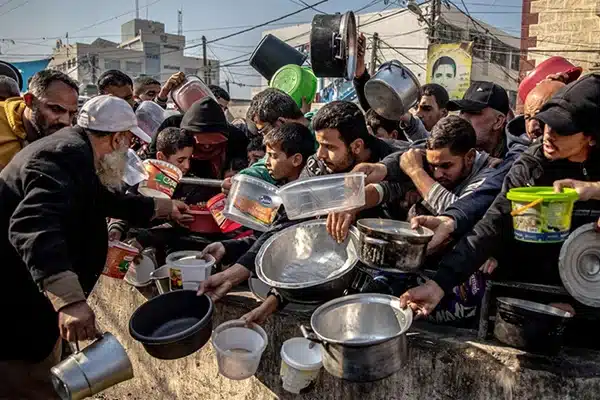

Olives: Olive production in Palestinian land has also been hampered by the Israeli regime’s obstructions. The uprooting of about one million olive trees by the Israeli army since 1967 and the destruction and theft of produce from 1,600 olive trees by Israeli settlers in 2021 are evidence of these hostilities.
Grapes, Eggplants, Tomatoes, and Onions: Zionist military restrictions on Palestinian movement in the West Bank, imposed since the 1980s, have caused Palestinian farmers producing grapes, eggplants, tomatoes, and onions to fall behind in competing with farmers in illegal Israeli settlements.
Black Goats: Owning black goats, a major income source for Palestinian Bedouins, has been banned by the Israeli regime since 1950, and Zionists destroy this vital income source by confiscating and slaughtering the goats.
Milk and Eggs: The Israeli regime subsidizes milk and eggs produced by Israeli farmers, stripping Palestinian farmers’ products of price competitiveness. As a result, Israeli products dominate the markets in the West Bank and Gaza.
Fish: Fish is one of the restricted items in Palestinian land, due to attacks by the Israeli navy on fishermen at sea. Between 2007 and 2021, Zionists attacked fishermen in Gaza’s restricted fishing zone over 2,265 times..
Vegetables: 35 percent of Gaza’s arable land for vegetables is inaccessible due to restrictions imposed by Zionists. Additionally, 13 million square meters of Gaza’s agricultural land have been damaged by Israeli herbicides.
Mushrooms: The Israeli regime forced a Palestinian mushroom farm to close in 2016 by preventing imports of necessary cultivation materials and charging storage fees at ports.
Wheat, Millet, and Barley: Through unplanned grain imports, the Israeli regime has harmed the cultivation of adapted local varieties—wheat, barley, and millet grown by Palestinians—reducing biodiversity in this land.
Strawberries: Strawberries produced by Gaza farmers are left out of markets due to the Israeli regime’s control over all exports and imports to the region.
Water: The Israeli regime controls West Bank water and routinely destroys related infrastructure. It has also caused the pollution of 97 percent of Gaza’s water.
Medicinal Plants: The Israeli regime has banned the purchase of certain medicinal plants in Palestine, imposing fines or imprisonment for it.2
Water Scarcity in a Land of Mediterranean Rains
One of the injustices the Israeli regime inflicts on the oppressed people of Palestine is preventing their access to clean and sufficient water. The imposed deprivation of Palestinians from water occurs while their land has a Mediterranean climate with rainy winters. Below, the restrictions imposed by the Israeli regime on water for Palestinians in the West Bank and Gaza are explained.
The West Bank is Thirsty
Palestinians in the West Bank are deprived of consuming clean and sufficient water due to the Israeli regime’s policies. This is despite the fact that annual rainfall in Ramallah (the center of the Palestinian Authority) exceeds that in London; annual precipitation in London is 596 millimeters (150 liters per day per person), and in Ramallah, it is 619 millimeters. The Israeli regime annually seizes over 80 percent of the groundwater aquifers in the West Bank’s mountainous regions through various methods, explained below:

- Control of Water Resources: The Israeli regime has full dominance over all water resources in the West Bank and monitors their use.
- Oversight of Water Supply: The Israeli regime determines the amount of water consumption by Palestinians and their annual quotas.
- Preventing Water Resource Development: Since 1967, the Israeli regime has not allowed Palestinians to dig any new wells, even in the most productive aquifers in the West Bank.
- Destruction of Water Infrastructure: The Israeli regime destroys West Bank water infrastructure used for Palestinian needs, including drinking, daily necessities, agriculture, herding, and more. For example, in 2011, the Israeli army demolished 89 water-related structures, including 21 wells and 34 rainwater reservoirs essential for agriculture and herding.
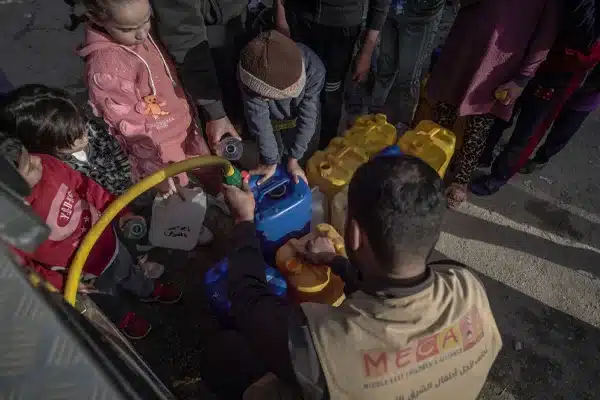

Through these policies, the Israeli regime has ensured that only 20 percent of the mountainous groundwater aquifers in the West Bank are allocated to supplying water for Palestinians in the area—such that only 70 liters of water per day is available per Palestinian in the West Bank. According to the World Health Organization, this amount should be 100 liters per day per person. However, by expropriating 80 percent of the West Bank’s aquifers and other water sources in occupied territories, the Jordan River Basin, and desalinated Palestinian waters, the Israeli regime provides 300 liters of water per day per Israeli settler.3
Thirst in the Gaza Strip
The shortage of clean drinking water in Gaza is due to the pollution of this region’s water sources and lack of access to other Palestinian water resources. Although international law specifies that the people of Gaza should receive a fair and reasonable larger share of their water from sources in occupied Palestinian territories, so far, due to Zionist hostilities, Gaza’s people have only accessed the transboundary coastal aquifer shared with occupied Palestinian areas and Egypt.4 On the other hand, 97 percent of Gaza’s water is undrinkable and contaminated with high levels of salt and other pollutants, caused by various factors.5 Below, the causes of Gaza’s water becoming unhealthy are listed:
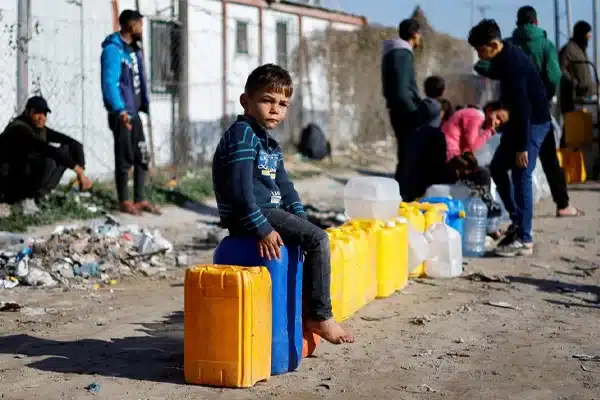
Israeli Violence in Palestine
One of the noteworthy issues in the Palestinian matter is how Palestinians cope with grief. Below, the experience of mourning and grief in New York City during the September 11 incident is compared with that of Gaza’s people: The people of New York City went through five stages of grief to overcome the loss of loved ones in the September 11 incident (2,823 killed):
1) Over-Extraction of Groundwater in Gaza: Due to the blockade imposed by the Israeli regime, Gaza’s people lack access to external water sources. This has led to overuse of Gaza’s groundwater, resulting in lowered aquifer levels. The drop in water levels has allowed polluted coastal water to infiltrate these aquifers, causing salinity from water flowing in from the Negev Desert.
2) Israeli Regime’s Wars Against Gaza: Continuous bombings by the Israeli regime have severely damaged Gaza’s water, treatment plants, and sanitation infrastructure.
3) Lack of Reconstruction and Development of Gaza’s Water Infrastructure: Restrictions imposed by the Israeli regime and international actors on importing materials needed for building water equipment in Gaza have caused the collapse of water and sewage infrastructure, leading to contamination of Gaza’s water sources.
4) Complete Power Outages in Gaza: The shortage of fuel and electricity in Gaza, resulting from the Israeli regime’s ongoing blockade, has prevented the operation of water and sewage treatment infrastructure in the region.
In addition to the mentioned factors, sewage infiltration and improper solid waste disposal have also caused Gaza’s water pollution and high nitrate levels, leading to unavoidable deaths and various diseases, including diarrhea; such that 26 percent of diseases in Gaza are water-related.6
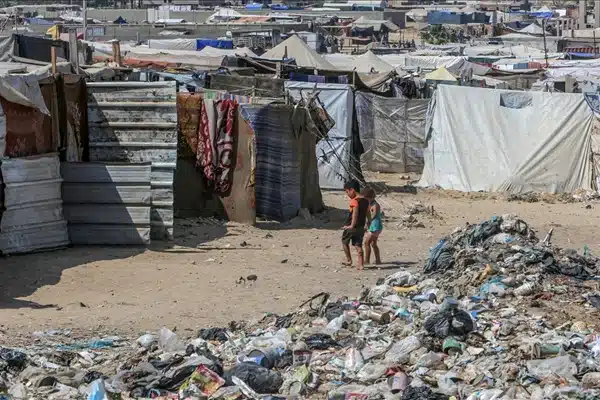
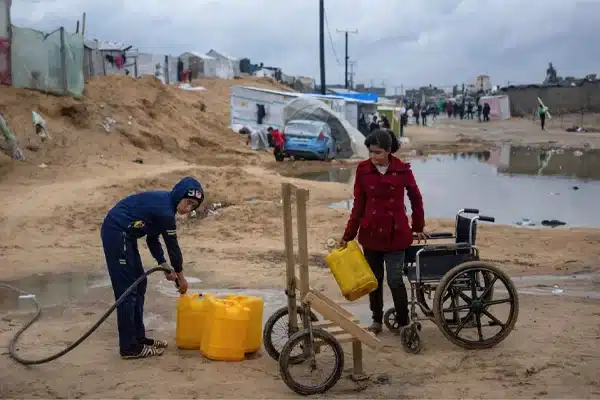
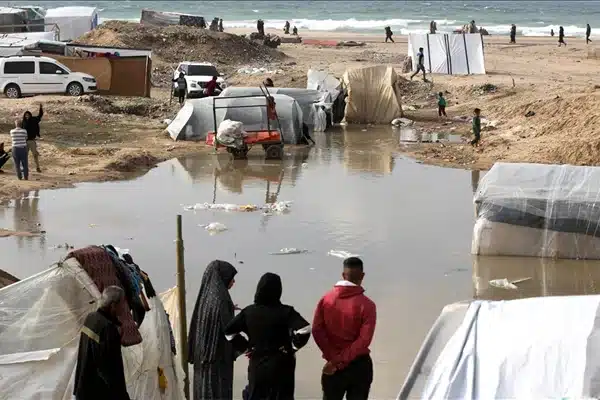
میدونستید آمریکا و اسرائیل تا حالا چند دفعه تعهدات خودشون درباره فلسطین رو زیر پا گذاشتن؟!
منابع
[1]. Error! Hyperlink reference not valid. (accessed on 21 March 2012)
Palestinian Water Authority, 2003. Rainfall Variability and Change in the West Bank (PDF)
"Amnesty, 2009. Troubled Waters - Palestinians denied fair access to water" (PDF)
UK DEFRA, 2013. Domestic Water Saving (accessed on 7 February 2013)
WHO, 2003. Domestic Water Quantity, Service Level and Health (PDF)
C. Messerschmid, 2007. Hydro-hegemony in shared Israeli, Palestinian groundwater resources (PDF)
EWASH, 2012. Israeli restrictions on the WASH sector in the Occupied Palestinian Territory and their impact on vulnerable communities (PDF)


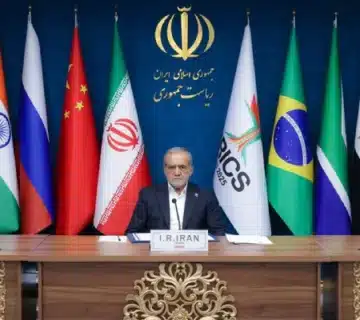


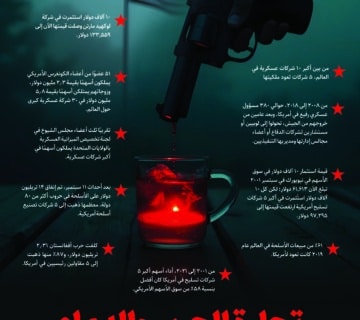
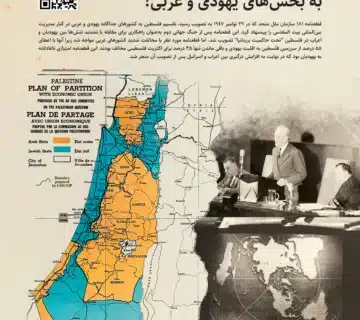
No comment